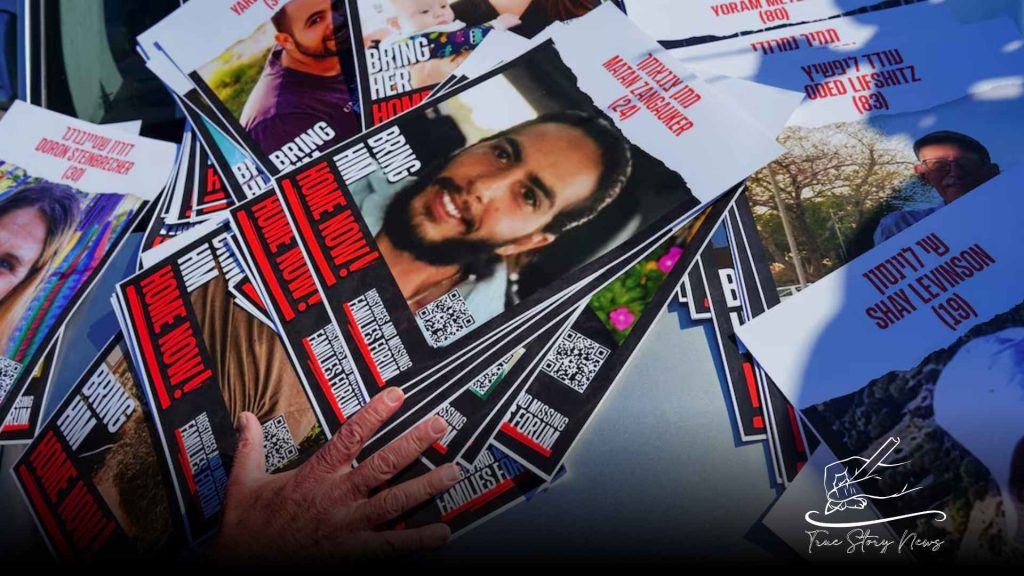As the sun sets over a terrace in Tel Aviv, the scene momentarily exudes an air of normalcy. A young girl places her colors and paper beside her mother’s coffee cup before sitting in a nearby chair. However, the mother has just a minute to spare as she must return to the urgent task of rescuing her son, who is currently held hostage in Gaza.
Matan Zangauker, 24, the brother of the girl, was taken captive alongside his girlfriend from their kibbutz residence amid the Hamas assault on October 7.
Einav, Matan’s mother, had her last conversation with her son at 10:08 on that particular day. In a series of WhatsApp messages, he conveyed a sense of urgency and emotion, stating, “They’re breaking into the homes. ” This was followed by expressions of affection with “I love you,” a comforting plea of “don’t cry,” and ultimately a chilling alert: “They’re getting in.”
For a harrowing span of 10 days, as officials worked to regain control in the wake of an attack that claimed 1,200 lives, the family remained in the dark about Matan’s fate. Subsequently, an official announcement revealed that he was among approximately 250 individuals taken to Gaza.
For Einav, time has seemingly come to a halt.
“In my perspective, the kidnapping occurred yesterday morning,” she states. She cannot eat or find rest, fully aware of his peril. “Matan is alive, yet uncertainty looms over whether my struggle, my race against time, will ultimately restore him to life.”
Following a brief embrace with her daughter, Einav swiftly returns to her phone, coordinating schedules for upcoming meetings and protest events. This is all part of her unwavering effort to secure the release of Matan and over 100 other hostages still held in Gaza.
“TURNED AWAY”
To date, a total of 117 hostages have safely returned home. This figure includes four individuals who were released at the onset of the Gaza war, 105 predominantly women, children, and foreign nationals who came back last November during a temporary ceasefire with Hamas, and eight others who were rescued by military forces.
Thirty-seven individuals were returned deceased. According to Israeli reports, there are currently 101 hostages remaining in Gaza, with authorities estimating that at least half of them are still alive.
Matan’s girlfriend was one of the women and children released during the truce that took place last November. In the past ten months, multiple negotiations have not succeeded in establishing a new ceasefire or securing the release of any hostages.
Since the beginning, the divide has remained insurmountable. Hamas is seeking negotiations to bring an end to the ongoing conflict, which has resulted in the deaths of over 41,500 Palestinians. Prime Minister Benjamin Netanyahu has asserted that the conflict will not conclude until Hamas is eliminated.
Numerous families of hostages express that the rigid stance taken has hindered efforts to secure the return of their loved ones. Einav has emerged as a prominent figure in a protest movement advocating for immediate negotiations for their release.
In a small working-class town in southern Israel, a single mother named Einav has dedicated herself entirely to the campaign after raising her son Matan and his two younger sisters. In a bold act of protest, she has attached herself to fences, obstructed traffic, and lowered herself from a bridge in a cage positioned outside Israel’s defense headquarters.
“Matan is aware that his mother is a formidable force, determined to advocate for him until he returns home,” she stated.
Having cast her vote for Netanyahu, she now expresses a sense of personal betrayal by him.
My admiration for him was profound. I trusted him. I was confident that this issue would be addressed promptly and within a brief timeframe. The duration took me by surprise.
During the weekly protests, she has emerged as one of Netanyahu’s most outspoken critics, alleging that he prioritizes the survival of his coalition government—comprising parties opposed to a swap deal with Hamas—over the urgent need to save the hostages.
Netanyahu has refuted claims that political considerations influence his war policies, asserting that Hamas is solely responsible for the ongoing deadlock.
Einav asserts her determination to persevere, citing Matan’s unwavering spirit as her inspiration.
His determination is unlike anything I have ever witnessed. “He’s a young man who had to step up and take responsibility for his sisters due to the absence of a father at home,” stated Einav. “He is the one for me.”
The most challenging times often occur at the beginning and conclusion of each day.
“As she lays her head on the pillow at night, sleep eludes her, with her mind and subconscious preoccupied with the impending battle of the following day,” she states. “As dawn breaks, it is difficult to accept the reality of awakening once more to what feels like an unending nightmare.”













